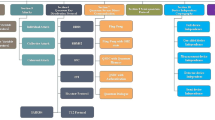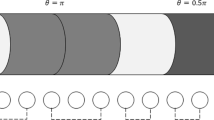Abstract
A significant aspect of quantum cryptography is quantum key agreement (QKA), which ensures the security of key agreement protocols by quantum information theory. The fairness of an absolute security multi-party quantum key agreement (MQKA) protocol demands that all participants can affect the protocol result equally so as to establish a shared key and that nobody can determine the shared key by himself/herself. We found that it is difficult for the existing multi-party quantum key agreement protocol to withstand the collusion attacks. Put differently, it is possible for several cooperated and untruthful participants to determine the final key without being detected. To address this issue, based on the entanglement swap** between G-like state and Bell states, a new multi-party quantum key agreement protocol is put forward. The proposed protocol makes full use of EPR pairs as quantum resources, and adopts Bell measurement and unitary operation to share a secret key. Besides, the proposed protocol is fair, secure and efficient without involving a third party quantum center. It demonstrates that the protocol is capable of protecting users’ privacy and meeting the requirement of fairness. Moreover, it is feasible to carry out the protocol with existing technologies.



Similar content being viewed by others
References
Bennett, C.H., Brassard, G.: Quantum cryptography: public key distribution and coin tossing. In: Proceedings of IEEE International Conference on Computers, Systems and Signal Processing. Bangalore, India, pp 175–179 (1984)
Ekert, A.K.: Quantum cryptography based on Bell’s theorem. Phys. Rev. Lett. 67, 661 (1991)
Bennett, C.H.: Quantum cryptography using any two nonorthogonal states. Phys. Rev. Lett. 68, 3121 (1992)
Shor, P.W., Preskill, J.: Simple proof of security of the BB84 quantum key distribution protocol. Phys. Rev. Lett. 85, 441 (2000)
Hwang, W.Y.: Quantum key distribution with high loss: toward global secure communication. Phys. Rev. Lett. 91, 057901 (2003)
Zhou, N., Wang, L., Gong, L., Zuo, X., Liu, Y.: Quantum deterministic key distribution protocols based on teleportation and entanglement swap**. Opt. Commun. 284, 4836–4842 (2011)
Diffie, W., Hellman, M.: New directions in cryptography. IEEE Trans. Inf. Theory 22, 644–654 (1976)
Zhou, N., Zeng, G., **ong, J.: Quantum key agreement protocol. Electron. Lett. 40, 1149–1150 (2004)
Bennett, C.H., Brassard, G., Crépeau, C., Jozsa, R., Peres, A., Wootters, W.K.: Teleporting an unknown quantum state via dual classical and Einstein-Podolsky-Rosen channels. Phys. Rev. Lett. 70, 1895 (1993)
Hsueh, C.C., Chen, C.Y.: Quantum key agreement protocol with maximally entangled states. In: Proceedings of the 14th Information Security Conference, pp 236–242. National Taiwan University of Science and Technology, Taipei (2004)
Chong, S.K., Tsai, C.W., Hwang, T.: Improvement on “Quantum key agreement protocol with maximally entangled state”. Int. J. Theor. Phys. 50, 1793–1802 (2011)
Tsai, C.W., Chong, S.K., Hwang, T.: Comment on quantum key agreement protocol with maximally entangled sates. In: Proceedings of the 20th Cryptology and Information Security Conference, pp 210–213. National Chiao Tung University, Hsinchu (2010)
Chong, S.K., Hwang, T.: Quantum key agreement protocol based on BB84. Opt. Commun. 283, 1192–1195 (2010)
Deng, F.G., Long, G.L., Wang, Y., **ao, L.: Increasing the efficiencies of random-choice-based quantum communication protocols with delayed measurement. Chin. Phys. Lett. 21, 2097 (2004)
Cao, Z.W., Feng, X.Y., Peng, J.Y., Zeng, G.H., Qi, J.: Efficient quantum private communication scheme based on dynamic control code sequence. Int. J. Theor. Phys. 56, 1141–1149 (2017)
Shi, R.H., Zhong, H.: Multi-party quantum key agreement with bell states and bell measurements. Quantum Inf. Process 12, 921–932 (2013)
Liu, B., Gao, F., Huang, W., Wen, Q.-Y.: Multiparty quantum key agreement with single particles. Quantum Inf. Process 12, 1797–1805 (2013)
Sun, Z., Zhang, C., Wang, B., Li, Q., Long, D.: Improvements on multiparty quantum key agreement with single particles. Quantum Inf. Process 12, 3411–3420 (2013)
Huang, W., Wen, Q.-Y., Liu, B., Su, Q., Gao, F.: Cryptanalysis of a multi-party quantum key agreement protocol with single particles. Quantum Inf. Process 13, 1651–1657 (2014)
Shen, D.S., Ma, W.P., Wang, L.L.: Two-party quantum key agreement with four-qubit cluster states. Quantum Inf. Process 13, 2313–2324 (2014)
Sun, Z.W., Yu, J.P., Wang, P.: Efficient multi-party quantum key agreement by cluster states. Quantum Inf. Process 15, 373–384 (2016)
He, Y.F., Ma, W.P.: Two-party quantum key agreement based on four-particle GHZ states. Int. J. Theor. Phys. 14, 1650007 (2016)
Sun, Z.W., Zhang, C., Wang, P., Yu, J.P., Zhang, Y., Long, D.Y.: Multi-party quantum key agreement by an entangled six-qubit state. Int. J. Theor. Phys. 55, 1920–1929 (2016)
Gu, J., Hwang, T.: Improvement of “Novel multiparty quantum key agreement protocol with GHZ states”. Int. J. Theor. Phys. 56, 3108–3116 (2017)
He, Y.F., Ma, W.P.: Two-party quantum key agreement with five-particle entangled states. Int. J. Quantum Inf. 15, 1750018 (2017)
Cai, B.B., Guo, G.D., Lin, S.: Multi-party quantum key agreement with teleportation. Mod. Phys. Lett. B 31, 1750102 (2017)
Liu, B., **ao, D., Jia, H.Y., Liu, R.Z.: Collusive attacks to “circle-type” multi-party quantum key agreement protocols. Quantum Inf. Process 15, 2113–2124 (2016)
Wang, P., Sun, Z.W., Sun, X.Q.: Multi-party quantum key agreement protocol secure against collusion attacks. Quantum Inf. Process 16, 170 (2017)
Lu, C.Y., Yang, T., Pan, J.W.: Experimental multiparticle entanglement swap** for quantum networking. Phys. Rev. Lett. 103, 020501 (2009)
Dür, W., Vidal, G., Cirac, J.I.: Three qubits can be entangled in two inequivalent ways. Phys. Rev. A 62, 062314 (2000)
Cao, Z.L., Yang, M.: Probabilistic teleportation of unknown atomic state using W class states. Phys. A 337, 132–140 (2004)
Yang, K., Huang, L., Song, F.: Quantum teleportation via GHZ-like state. Int. J. Theor. Phys. 48, 516–521 (2009)
Deng, F.G., Li, X.H., Zhou, H.Y., Zhang, Z.: Improving the security of multiparty quantum secret sharing against Trojan horse attack. Phys. Rev. A 72, 044302 (2005)
Li, X.H., Deng, F.G., Zhou, H.Y.: Improving the security of secure direct communication based on the secret transmitting order of particles. Phys. Rev. A 74, 054302 (2006)
Lin, J., Hwang, T.: New circular quantum secret sharing for remote agents. Quantum Inf. Process 12, 685–697 (2013)
Liu, W.J., Chen, Z.Y., Ji, S., Wang, H.B., Zhang, J.: Multi-party semi-quantum key agreement with delegating quantum computation. Int. J. Theor. Phys. 56, 3164–3174 (2017)
Cabello, A.: Quantum key distribution in the Holevo limit. Phys. Rev. Lett. 85, 5633–5638 (2000)
Acknowledgements
This work is supported by the National Natural Science Foundation of China (Grant No. 61561033), and the Natural Science Foundation of Jiangxi Province (Grant No. 20171BAB202002).
Author information
Authors and Affiliations
Corresponding author
Rights and permissions
About this article
Cite this article
Min, SQ., Chen, HY. & Gong, LH. Novel Multi-Party Quantum Key Agreement Protocol with G-Like States and Bell States. Int J Theor Phys 57, 1811–1822 (2018). https://doi.org/10.1007/s10773-018-3706-6
Received:
Accepted:
Published:
Issue Date:
DOI: https://doi.org/10.1007/s10773-018-3706-6




